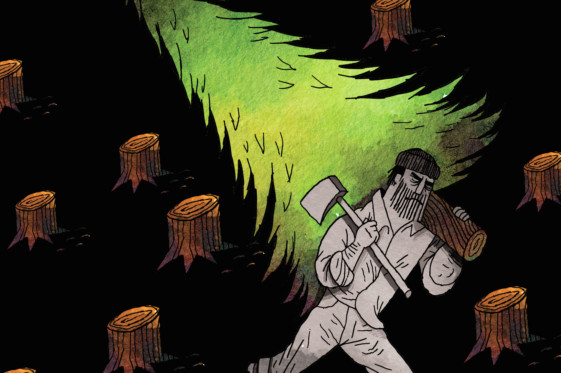
Barkskins
By Annie Proulx, Scribner, 736 pages, $32
Like the Lorax, Annie Proulx speaks for the trees. Her new novel, “Barkskins”, is a clamorous epic of environmental despoliation. It plays out across 700-plus pages and more than 300 years, from the arrival of woodcutting French settlers in Canada in 1693 through an eyewitness account of melting glaciers in 2013.
In between, there is clear-cutting and more clear-cutting, with the occasional sidebar about eating or scheming or killing. This is a jeremiad about the loss of North America’s “monstrous pine finery”, in the author’s resonant phrase, and thus its weird, old pagan soul. This novel is a flood of acid rain.
Slaughter of every variety is on Proulx’s mind. “Barkskins” — the title refers to woodcutters — is a Baedeker of doom. Characters die from cholera and measles and smallpox, from shipwrecks and scalpings and botched amputations and occult tortures. More often, they perish in grisly logging mishaps. No one ever seems to yell, “Timber!”
Proulx is adept at this culling. She has a lesser knack for first bringing her men and women to life. “Barkskins” rarely warms in your hands. Its ideas are more finely bevelled than its people, never a good sign.
In “Barkskins”, Proulx favours “characters” rather than character, as Alfred Kazin complained about John Irving. (Among the names here: Blade Scugog, Dud McBogle and Hudson Van Dipp.) Watching its action is like strolling around the world’s largest ant farm. There’s more wriggling than drama.
“Barkskins” is Proulx’s fifth novel and ninth work of fiction. It’s an ambitious project for any novelist, much less one who, like Proulx, is now 80. At its best, it is vivid, mean and wordy, as if the film “The Revenant” had been annotated by Bob Dylan — the Dylan who wrote, in “Blind Willie McTell”, that “power and greed and corruptible seed/seem to be all that there is”.
Proulx’s many readers will note, too, how often logging leads her characters to take to the sea. “Barkskins” can be read, to some degree, as a many-angled precursor to the author’s novel “The Shipping News” (1993), which won the Pulitzer Prize and the National Book Award.
“Barkskins” begins when two skinny and penniless Frenchmen, Charles Duquet and René Sel, arrive in Canada as indentured servants. Duquet soon manages to escape. He becomes a fur trader and an imposing timber entrepreneur. He changes his surname to Duke, and a logging dynasty is born.
Sel doesn’t escape. A preternaturally gifted logger, he works and he suffers. He is forced to marry an older woman, a native of the Mi’kmaw tribe. They have strong, beautiful children who suffer, too. We follow the Dukes and the Sels across many generations.
A great deal of learning is on display in “Barkskins”, as there is in nearly everything Proulx writes. You will absorb more here about cutting and sawing and pulping and shipping and estimating lumber yields than you might think possible. There are lessons about negotiation. The care of a burn victim is minutely detailed.
The meals in “Barkskins” offer fragrant lessons in backwoods cuisine. Among the consumables: beaver bone soup, moose bone marrow, woodcock hung until it reached the desired “hallucinogenic point of decay”, caribou haunch, eels with sour-grass sauce, roly-polies and pandowdies. About one woman, we read, “Anguish and rage mingled in her like a kind of soup made from nettles and grit”.
Proulx, a putter-inner, rather than a taker-outer, spangles her sentences with unusual words (“queaches”, “sphagnum”) and flora (hairy-stem mastodon flowers). If the word she needs does not exist, she will invent it. You can imagine her saying to her editor, as John O’Hara remarked to his: “Don’t go citing dictionaries to me ... Dictionary people consult me, not I them.”
Often enough these sentences break from the woods into the clearing of sunlit loveliness. A moon is “a slice of white radish”. Visiting his childhood home, one man is catapulted into his past “as though seated on a swing that someone had suddenly given a great shove”.
The larger story “Barkskins” has to tell is about arrogant white Christian men coming to subdue the “evil” wilderness, destroying the land and culturally annihilating the Native Americans as they march along. It is a novel about human infestation, about greed, about virgin landscapes filled suddenly with “insufferable whiteman stink”.
It is possible to utterly share Proulx’s environmental views while noting how this book’s homilies fall, like a succession of cut trees, into your path. From the start, trees shiver and inhale and help humans heal. Lives are filled with “leafy meaning”. All things, not just bark and skin, are seen to be connected.
This novel is a brief against managed forests and for entirely wild ones. A character who is something of a stand-in for the author says: “I am sure that wild natural woodlands are the only true forests. The entire atmosphere — the surrounding air, the intertwined roots, the humble ferns and lichens, insects and diseases, the soil and water, weather. All these parts seem to play together in a kind of wild grand orchestra. A forest living for itself rather than the benefit of humankind.”
Op-ed sound bites such as this one light the way towards this novel’s truly abysmal ending, in which a modern scientist solemnly warns about global warming that “a great crisis is just ahead”, and a woman wants to cry out “The forests, the trees, they can change everything!” You feel your synapses, as did the forests, turn to pulp.
–New York Times News Service









